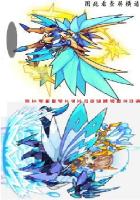"Still at work!" Crayford exclaimed, looking at the half-demolished bed-place. "Give yourself a little rest, Richard.
The exploring party is ready to start. If you wish to take leave of your brother officers before they go, you have no time to lose."
He checked himself there, looking Wardour full in the face.
"Good Heavens!" he cried, "how pale you are! Has anything happened?"
Frank--searching in his locker for articles of clothing which he might require on the journey--looked round. He was startled, as Crayford had been startled, by the sudden change in Wardour since they had last seen him.
"Are you ill?" he asked. "I hear you have been doing Bateson's work for him. Have you hurt yourself?"
Wardour suddenly moved his head, so as to hide his face from both Crayford and Frank. He took out his handkerchief, and wound it clumsily round his left hand.
"Yes," he said; "I hurt myself with the ax. It's nothing. Never mind. Pain always has a curious effect on me. I tell you it's nothing! Don't notice it!"
He turned his face toward them again as suddenly as he had turned it away. He advanced a few steps, and addressed himself with an uneasy familiarity to Frank.
"I didn't answer you civilly when you spoke to me some little time since. I mean when I first came in here along with the rest of them. I apologize. Shake hands! How are you? Ready for the march?"
Frank met the oddly abrupt advance which had been made to him with perfect good humor.
"I am glad to be friends with you, Mr. Wardour. I wish I was as well seasoned to fatigue as you are."
Wardour burst into a hard, joyless, unnatural laugh.
"Not strong, eh? You don't look it. The dice had better have sent me away, and kept you here. I never felt in better condition in my life." He paused and added, with his eye on Frank and with a strong emphasis on the words: "We men of Kent are made of tough material."
Frank advanced a step on his side, with a new interest in Richard Wardour.
"You come from Kent?" he said.
"Yes. From East Kent." He waited a little once more, and looked hard at Frank. "Do you know that part of the country?" he asked.
"I ought to know something about East Kent," Frank answered.
"Some dear friends of mine once lived there."
"Friends of yours?" Wardour repeated. "One of the county families, I suppose?"
As he put the question, he abruptly looked over his shoulder. He was standing between Crayford and Frank. Crayford, taking no part in the conversation, had been watching him, and listening to him more and more attentively as that conversation went on. Within the last moment or two Wardour had become instinctively conscious of this. He resented Crayford's conduct with needless irritability.
"Why are you staring at me?" he asked.
"Why are you looking unlike yourself?" Crayford answered, quietly.
Wardour made no reply. He renewed the conversation with Frank.
"One of the county families?" he resumed. "The Winterbys of Yew Grange, I dare say?"
"No," said Frank; "but friends of the Witherbys, very likely. The Burnhams."
Desperately as he struggled to maintain it, Wardour's self-control failed him. He started violently. The clumsily-wound handkerchief fell off his hand. Still looking at him attentively, Crayford picked it up.
"There is your handkerchief, Richard," he said. "Strange!"
"What is strange?"
"You told us you had hurt yourself with the ax--"
"Well?"
"There is no blood on your handkerchief."
Wardour snatched the handkerchief out of Crayford's hand, and, turning away, approached the outer door of the hut. "No blood on the handkerchief," he said to himself. "There may be a stain or two when Crayford sees it again." He stopped within a few paces of the door, and spoke to Crayford. "You recommended me to take leave of my brother officers before it was too late," he said. "I am going to follow your advice."
The door was opened from the outer side as he laid his hand on the lock.
One of the quartermasters of the _Wanderer_ entered the hut.
"Is Captain Helding here, sir?" he asked, addressing himself to Wardour.
Wardour pointed to Crayford.
"The lieutenant will tell you," he said.
Crayford advanced and questioned the quartermaster. "What do you want with Captain Helding?" he asked.
"I have a report to make, sir. There has been an accident on the ice."
"To one of your men?"
"No, sir. To one of our officers."
Wardour, on the point of going out, paused when the quartermaster made that reply. For a moment he considered with himself. Then he walked slowly back to the part of the room in which Frank was standing. Crayford, directing the quartermaster, pointed to the arched door way in the side of the hut.
"I am sorry to hear of the accident," he said. "You will find Captain Helding in that room."
For the second time, with singular persistency, Wardour renewed the conversation with Frank.
"So you knew the Burnhams?" he said. "What became of Clara when her father died?"
Frank's face flushed angrily on the instant.
"Clara!" he repeated. "What authorizes you to speak of Miss Burnham in that familiar manner?"
Wardour seized the opportunity of quarreling with him.
"What right have you to ask?" he retorted, coarsely.
Frank's blood was up. He forgot his promise to Clara to keep their engagement secret--he forgot everything but the unbridled insolence of Wardour's language and manner.
"A right which I insist on your respecting," he answered. "The right of being engaged to marry her."
Crayford's steady eyes were still on the watch, and Wardour felt them on him. A little more and Crayford might openly interfere.
Even Wardour recognized for once the necessity of controlling his temper, cost him what it might. He made his apologies, with overstrained politeness, to Frank.
"Impos sible to dispute such a right as yours," he said. "Perhaps you will excuse me when you know that I am one of Miss Burnham's old friends. My father and her father were neighbors. We have always met like brother and sister--"
Frank generously stopped the apology there.















